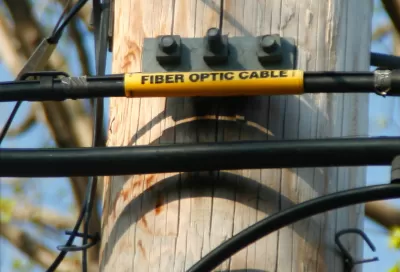Accessing the internet is too expensive for many, not just in rural areas but also in cities.

Expensive internet is not just a rural problem. "The Bronx has only 35.3 percent access, and Manhattan fares only slightly better with 35.6 percent access; Clark County, Nevada, home to Las Vegas, has 39.1 percent access," Clare Malone writes for FiveThirtyEight. The fact that in much of America less than half the population has access to the internet at home is an issue of equity, "Without that knowledge and exposure, a person is likely to be further marginalized in economic and educational opportunities, caught in a cycle of literal and metaphorical disconnection," Malone writes.
Cities are looking for ways to make the internet more affordable for their citizens, but it's difficult to bring down prices in an industry where companies like Comcast and AT&T face so little competition. Still, cities like Washington, D.C. are implementing programs to reach out to those who may not be online. "The Connect.DC initiative works to provide computer courses and subsidize internet access and devices in order to bridge a divide that many worry holds back a skills-based economy and diminishes the opportunities of significant parts of society," Malone reports.
FULL STORY: Lots Of People In Cities Still Can’t Afford Broadband

Maui's Vacation Rental Debate Turns Ugly
Verbal attacks, misinformation campaigns and fistfights plague a high-stakes debate to convert thousands of vacation rentals into long-term housing.

Planetizen Federal Action Tracker
A weekly monitor of how Trump’s orders and actions are impacting planners and planning in America.

In Urban Planning, AI Prompting Could be the New Design Thinking
Creativity has long been key to great urban design. What if we see AI as our new creative partner?

King County Supportive Housing Program Offers Hope for Unhoused Residents
The county is taking a ‘Housing First’ approach that prioritizes getting people into housing, then offering wraparound supportive services.

Researchers Use AI to Get Clearer Picture of US Housing
Analysts are using artificial intelligence to supercharge their research by allowing them to comb through data faster. Though these AI tools can be error prone, they save time and housing researchers are optimistic about the future.

Making Shared Micromobility More Inclusive
Cities and shared mobility system operators can do more to include people with disabilities in planning and operations, per a new report.
Urban Design for Planners 1: Software Tools
This six-course series explores essential urban design concepts using open source software and equips planners with the tools they need to participate fully in the urban design process.
Planning for Universal Design
Learn the tools for implementing Universal Design in planning regulations.
planning NEXT
Appalachian Highlands Housing Partners
Mpact (founded as Rail~Volution)
City of Camden Redevelopment Agency
City of Astoria
City of Portland
City of Laramie





























